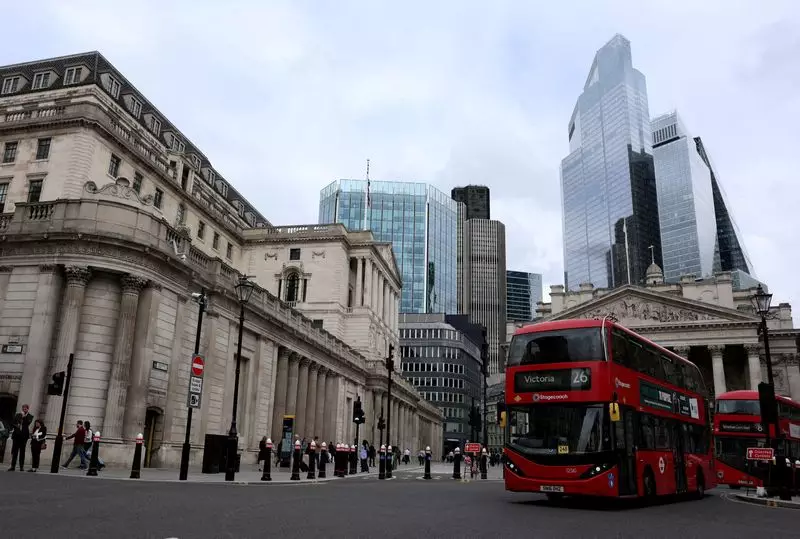The bond market in the United Kingdom finds itself at a critical juncture, with concerns over the nation’s fiscal health prompting apprehensive responses from investors. This renewed bond vigilantism poses a significant challenge for the government, potentially pressuring it into politically sensitive decisions—including tax increases or substantive public spending cuts—to appease a wary investment community. Amidst this tumultuous climate, Chancellor of the Exchequer Rachel Reeves faces a dual-edged sword: while she grapples with escalating bond yields, there remains a sliver of hope that the Bank of England’s (BoE) balance sheet could offer some reprieve.
As 2025 commenced, UK gilt yields surged to levels unseen since 2008, igniting fears of instability within the bond market. Recent fluctuations, however, were softened by disappointing inflation data from December, which alleviated some immediate pressure. Despite this relief, the overarching sentiment is that the UK bond market could experience significant turbulence in the months to come. The anxieties surrounding global bond yields, particularly in relation to potential inflation stemming from U.S. policy shifts under President Donald Trump’s administration, have crafted a landscape of uncertainty. However, UK-specific issues, chiefly the newly elected Labour government’s economic policies, are further compounding investor trepidation, as these policies may exacerbate national debt without delivering the expected economic growth.
Complicating the landscape is the Bank of England’s transition to a policy of ‘quantitative tightening’ (QT). Unlike its previous role as a primary buyer of UK government bonds, the BoE is now actively selling gilts—creating a stark departure from earlier strategies focused on liquidity enhancement. The implications are profound: with the gilt market valued at around £2.6 trillion, the BoE’s shift signals a significant contraction in available market liquidity. Projections indicate that the bank’s gilt holdings could diminish from nearly £900 billion to approximately £560 billion by late September 2025 if current QT measures persist.
This transition unfolds as the UK government plans to issue roughly £300 billion in gilts annually for the upcoming fiscal years. Consequently, the bond market must grapple with absorbing around £400 billion in new supply within the next twelve months, challenging its capacity and further elevating the risk of increased yields. Importantly, if the BoE were to pause its sales, it could alleviate some supply pressure, potentially leading to lower yields and offering a crucial lifeline to Reeves as she confronts heightened debt interest payments.
Navigating this landscape is fraught with political implications. The specter of policy designs that impede the independence of the BoE looms large, especially considering the backdrop of the previous government’s department under Liz Truss, which attempted to encroach on the BoE’s autonomy. Reeves has signaled her commitment to respect the BoE’s independence, a move aimed at restoring investor confidence. Nevertheless, any indication that the bank is altering its QT strategy due to fiscal pressures could send shockwaves through the market, breeding uncertainty and capital flight.
The risk is exacerbated by the ongoing discussions around maintaining the integrity of monetary policy transmission. Should the BoE choose to cut official interest rates while market rates remain elevated, it may inadvertently tighten monetary conditions during a time when looser standards are sought. Such a disconnect might misalign the central bank’s objectives and the realities facing the broader economy.
As the UK prepares to confront these fiscal and monetary challenges head-on, the stakes for Reeves and the BoE are higher than ever. Market conditions will demand deft navigation to maintain both investor confidence and economic stability. Observers point out that any shift in the BoE’s QT strategy must be framed within the context of maintaining market functionality, with Deputy Governor Sarah Breeden underscoring ongoing market monitoring as a proactive measure.
Economist Simon French highlights that any alteration in the current QT approach would likely invite political scrutiny and claims of government favoritism. The specter of past allegations, where the BoE was accused of facilitating government fiscal misconduct during the pandemic, still lingers, complicating the narrative. Yet, as pressures mount and market conditions remain uncertain, finding a path forward that balances fiscal responsibility with monetary prudence will be essential for the UK’s economic resilience.
The intersection of political decisions and market dynamics in the UK bond sector underscores the precariousness of the current economic landscape. For Chancellor Reeves and the Bank of England, the journey ahead will require careful orchestration of policy initiatives that not only restore confidence but also foster sustainable growth amidst an uncertain global backdrop. As bond vigilantism casts a long shadow, the government must endeavor to navigate these turbulent waters without compromising the integrity of its fiscal and monetary frameworks, ensuring that the long-term stability of the UK economy remains paramount.

